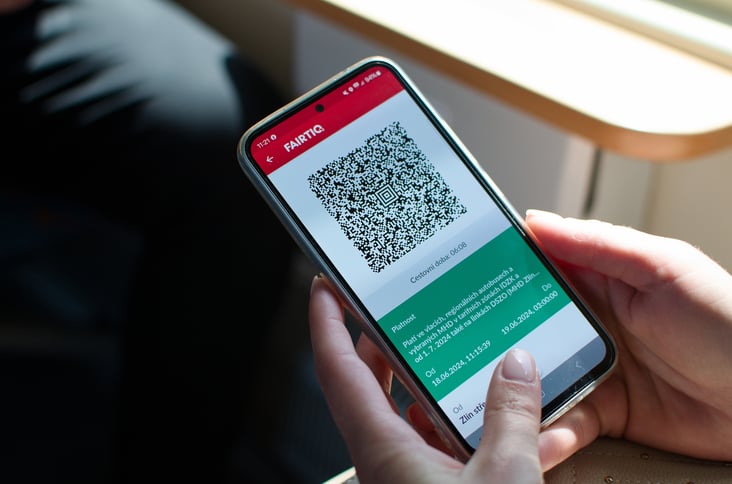
Fares for our Times - Insights from Germany and North America
On November 4, the Ontario Public Transit Association (OPTA) hosted a webinar on fare innovation in Germany and North America with:
Hendrik Koch, Director, Mobilité Consulting
Eduard Rollman, Lead, Marketing Competence Centre NRW, Verkehrsverbund Rhein-Sieg (VRS) (Cologne)
Annalise Czerny, Founder, Annalise Czerny Consulting
And moderated by · Sarah Collard from FAIRTIQ

🎥 Click HERE for a link to the recording of the webinar.
📝 Click HERE for the slide deck for Hendrik Koch.
📝 Click HERE for the slide deck for Eduard Rollman.
Commuters have fallen out of passes and they need parachutes!
Riders are leaving passes behind - sales have declined between 50 and 90%, according to Annalise. Hendrik used the image of the parachute to describe new fare products that reward frequency of usage even if transit riders don’t know how much they’ll be riding in advance.
Transit Pricing 4.0 is here
Wearing his consulting hat, Hendrik broke down his vision for transit pricing, combining distance-based fares that are easy to understand with pricing based on capacity like time of day or location, with opportunities for 3rd party sponsorships, and finally discounts based on eligibility and usage.

Free to roam, finally
Eduard shared the new statewide fares soon to be introduced in the state of North Rhine Westphalia (NRW). Germany’s largest state with 18 million residents and pre-COVID ridership of 2.2 billion trips per year. Although its 100+ operators are already organized in four transport associations, boundaries meant that travelling across the fare boundary carried a significant penalty. On December 1, travellers will pay a base fare ranging between €1.30 and €1.60 depending on the point of departure, a per-kilometer fare between €0.20 and €0.27 depending on the area of travel, and a 24h cap ranging between €19 and €25, and €30 for statewide travel. So what makes them interesting to consider, and popular in Germany?
- They require no knowledge of fare structures
- They erase artificial zone boundaries
- They are fair
- They are trusted thanks to caps
- They allow local autonomy to set fares
While NRW has not started its statewide fares yet, Hendrik stated that e-fares have been found to increase ridership by 10% and are well-received by riders where they have been implemented.
NRW has set aside 100 million euros over 10 years to offset potential revenue loss by local operators, since some fares are expected to go down.

Flex offers
NRW agencies have also been experimenting with bundles of 10 or 12 24h tickets, valid for a month to replace passes - riders do not have to decide in advance what day to ride.
Thanks, riders!
Like many fare associations in Germany, NRW associations thanked riders by simply expanding the geographical eligibility of their passes. In the summer months of 2020 and 2021, pass holders of a given fare association in NRW could now travel statewide at no extra cost, and NRW joined a national campaign to make local passes valid nationwide for 2 weeks in September.
Hot tips from the panelists:
Now is the time - when revenues are down, you have less to lose
North American agencies that have experienced significant revenue loss and were highly dependent on now-depressed fare revenue may have more latitude to try new fares. Especially fares that attract new riders and encourage existing riders to use transit more.
Leapfrog
Agencies that are not tied to a large legacy system can leapfrog to the latest technologies - customer-centric, nimble, modular and flexible.
Go past about sunk costs
Even if your legacy fare system costs more than what you’d care to admit, look ahead, and don’t hesitate to bring in new, complementary mobile options in parallel - the focus should be on attracting and retaining customers, and providing them with a great experience.
Don’t aim for perfection
You cannot and will not make everyone happy, so pull the trigger and adjust as you go. However, equity should be a key consideration for public agencies.
Put learning at the heart of your pilots
Make sure to get great data and adjust your fares as you learn. Systems that produce origin and destination data, and all points in between, including transfers - all time-stamped - can generate insights you didn’t have before. Agencies can use these insights to understand how travel patterns are evolving, the impacts of pricing and service changes, and help direct resources where they have the most impact.
Just do it!
People expect new fare products and agencies need to bring customers back. It’s never been a better time to experiment.



.png?width=732&name=image%20(2).png)




Share